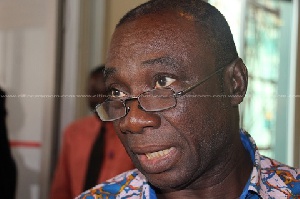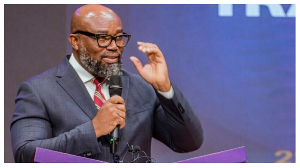Ghana’s energy sector is in “serious financial distress”, former Minister of Power Dr Kwabena Donkor has said.
According to him, until the government pumps in the necessary funds to rescue the sector, the intermittent power cuts experienced by customers will persist.
Dr Donkor told Benjamin Akapko on Class91.3FMm’s Executive Breakfast Show on Thursday, 28 March 2019 that: “Load shedding can only happen today because we may not have money to buy fuel”, stressing: “The energy sector is in financial distress”. “If there were a stronger word than distress, I would use it. Serious distress”.
“The solution” the Pru East MP said, “lies in getting and pumping money into the sector”.
Painting a picture of the debt mesh in the sector, Dr Donkor said: “If you look at the performance of ECG, GRIDCo, NEDCo, VRA, their financial performance is deteriorating with every year”.
“In the last quarter of 2018”, he said, “ECG’s losses exceeded GHS1 billion – in a single quarter”.
“The sector is bedeviled by debt. As we sit here, Ghana Gas owes GNPC over $500 million for gas supply because VRA is unable to pay, VRA is the major offtaker, they are unable to pay Ghana Gas. They are unable to pay Ghana Gas because ECG is unable to pay VRA for power generated. ECG owes because its current tariff is not commercially competitive and they are also unable to collect even what ought to be coming to them, especially from the government”.
Dr Donkor also mentioned that the poor performance of the Ghana cedi against the dollar has had a toll on the energy sector.
He explained: “In the power sector, if you take away salaries and wages, about 80 per cent of the payables of the sector is dollar-denominated and yet their receivables are cedi-denominated. So any deterioration in the dollar-cedi relationship impacts negatively on the sector. Since the last tariff adjustment, there’s been massive deterioration of the cedi against the dollar.
“So, automatically [ECG gets worse off], particularly so when PURC, for reasons best known to itself and the government, decided to remove tariffs for domestic consumers, probably in the fulfilment of a manifesto promise. I don’t have a problem because the Ghanaian state is the sole shareholder of these state entities, cash flows should come from operating revenues or capital injection by the shareholder.
“If for any political reason, manifesto fulfilment there’s been this reduction, then please the shareholder has a responsibility to inject capital in the form of equity.
“Last year, GRIDCo had to postpone nearly 80 per cent of all its planned capital expenditure for lack of cash flow and the same goes for all the power sector agencies.
“So, as a people, we own these entities, we cannot eat our cake and have it. We have not placed enough emphasis on efficiency gains – both at the supply end and the demand end. The average Ghanaian household can reduce their power consumption in wattage by about 30 per cent. … So my advice to government is that going forward we should spend money on educating people and improving efficiency at the demand side”, he said.
Dr Donkor, who was minister during the peak of the energy crisis in the Mahama administration, said despite the challenges he faced at the time, he managed to add a substantial generation capacity to Ghana’s power mix.
“It was the most difficult portfolio at the time in the country. Indeed, a good friend of the president’s asked me in Twi when I was appointed, to wit, ‘Kwabena, do you truly believe this man likes you?’ Somebody had to carry the can. It was a difficult portfolio, the circumstances were difficult and Ghanaians had become fed up, so, nobody was prepared to even listen to – excused my language – rational explanation. And I can understand why: it was a difficult period, but I thank God we improved generation and improved it so well that today we are even being accused of having created excess”, he told Benjamin Akakpo.
General News of Thursday, 28 March 2019
Source: classfmonline.com













